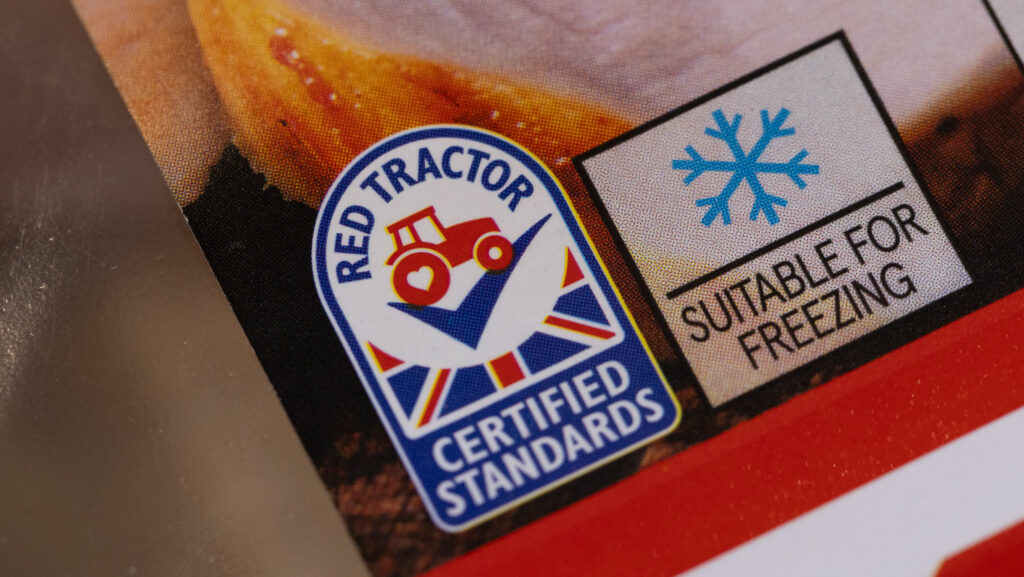Review calls for overhaul of Red Tractor leadership approach
 © GNP
© GNP The UK’s leading farm assurance scheme, Red Tractor, is facing further scrutiny after an independent review called for an overhaul of its leadership and governance.
Commissioned by the AHDB and farming unions such as the NFU, the review (opens as PDF) highlights significant flaws within Red Tractor, particularly in how the scheme engages with farmers.
Red Tractor has faced criticism from farmers who argue that it puts them at a disadvantage compared with unassured imports.
See also: Will vet assurance shake up third-party audits?
Its controversial plans to introduce the Greener Farms Commitment (GFC) in April 2024, aimed at adding voluntary environmental standards, intensified these concerns.
Following significant farmer opposition, which led to the GFC being scrapped, this broader review was initiated.
The review calls for a “fundamental reset” of the UK farm assurance system, recommending simplified audits, greater farmer involvement in standards development, and improved communication across the industry.
Conducted by four commissioners over nine months, the review found that many farmers have lost confidence in Red Tractor.
Evidence gathered pointed to a growing gap between those managing the scheme and its members, with farmers increasingly feeling that the scheme is “done to them” rather than being something they “own”.
Tony Goodger, head of communications at the Association of Independent Meat Suppliers (Aims), said the report encapsulated long-standing criticisms of Red Tractor that had not been addressed.
Aims, a trade body which represents the UK meat and poultry processing industry, is launching an alternative assurance scheme later this year which will make use of blockchain technology and artificial intelligence.
Leadership
The review is particularly critical of Red Tractor’s leadership for failing to adequately consult with stakeholders and for being defensive in the face of criticism.
“We have found an organisation that is somewhat entrenched and defensive,” the review says, stressing the need for a reset to the leadership approach.
Despite the criticism, the review acknowledges that Red Tractor maintains strong support among many farmers, notably in the pigs sector, and the principle of a UK-wide farm assurance scheme is “well supported”.
A core recommendation is for Red Tractor to adopt a more transparent, consultative approach and work more closely with farmers, ensuring they are central to developing future policies.
“Central to strengthening Red Tractor will be a board and senior executive team that recognises the scale of concern and urgency of action,” the report advises, although it adds: “We are concerned that is not the case.”
Staffordshire farmer Clive Bailye, a vocal critic of Red Tractor, welcomed the report, agreeing with many of its findings.
“The challenge now is to see how Red Tractor and its governance implements these recommendations and gets the necessary industry buy-in to build a far more farmer-centric assurance scheme that could finally add genuine value to their products,” he said.
“A change of management would be a big step towards rebuilding farmers’ trust and confidence in Red Tractor Assured.”
The review also recommends that Red Tractor implement the findings of the independent Campbell-Tickell report, which assessed its governance structure.
While that report deemed the governance sound, it highlighted complexities and communication issues requiring urgent attention.
Evolution
Dr David Llewellyn, the lead commissioner for the review, said farm assurance systems must evolve to meet the challenges of modern farming.
“Farmers must be central to the development of these schemes. They need to be supported, not burdened, by assurance systems that are seen as bureaucratic and disconnected from the realities of modern farming,” he said.
Red Tractor welcomed the farm assurance review’s conclusions and stressed the need for internal discussions, including feedback from sector boards, before it could respond more fully.
Key recommendations of the review
The UK Farm Assurance Review calls for a “fundamental reset” of the system to rebuild trust among farmers.
Its nine key recommendations include simplifying on-farm audits, ensuring that farmers lead standards development, and embracing technology to improve efficiency.
The review suggests launching an industry-led initiative to define future environmental goals and positioning UK farming as a competitive advantage.
It also calls for regulatory requirements to be linked to a government-approved “earned recognition” system.
The review highlights the need for greater co-ordination between farm assurance schemes within the UK and better positioning of UK agriculture in global markets.
It says improved communication with farmers is crucial to regaining trust, and Red Tractor must complete governance reforms as outlined in the independent Campbell-Tickell review, published last February.
NFU president Tom Bradshaw welcomed the review, calling it a “reset moment” for farm assurance schemes to better serve the UK food supply chain.
He stressed the importance of delivering on these recommendations and committed to working with stakeholders to move them forward.
Tenant Farmers Association chief executive George Dunn said the review’s recommendations “must be taken forward by farm assurance bodies”.
